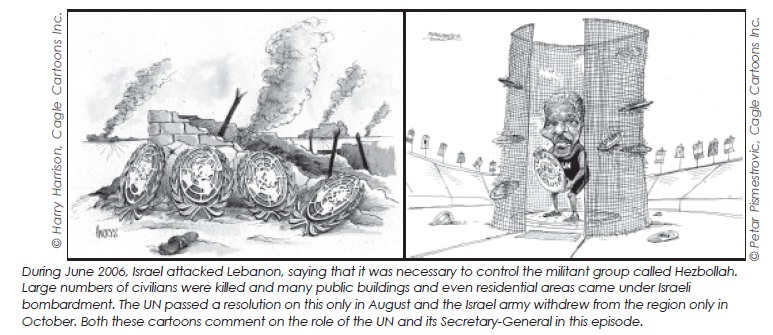#Fight with Covid_19
The United Nation [UN]
- The United Nations was established in 1945 immediately after the Second World War. It was a successor to the league of nations which was formed after the First World War.
- The objective of United Nations is to prevent international conflict and to facilitate cooperation among states.
- In the UN Security Council, there are five permanent members (United Kingdom, United State of America, Russia, France and China) and other non-permanent members who are elected after every two years. The most important public figure of the UN is the Secretary General.
- There are different structures and agencies of UN. These include World Health Organisation (WHO), the United Nations Development Programme (UNDP), the United Nations Human Rights Commission (UNHRC ), the United Nations High Commission for Refugees (UNHCR) etc.
The UN in a Unipolar World
- It is believed by many countries that the reform and restructuring of the UN could help the UN cope better with a unipolar world in which the US was the most powerful country.
- The US stands as the only superpower after the disintegration of USSR hence US power cannot be easily checked.
- Within the UN, the influence of the US is considerable. As the single largest contributor to the UN, the US has unmatched financial power.
- The UN is not therefore a great balance to the US. Nevertheless, in a unipolar world in which the US is dominant, the UN can and has served to bring the US and the rest of the world into discussions over various issues.
- The UN is an imperfect body, but without it the world would be worse off.
- It is important for people to use and support the UN and other international organisations in ways that are consistent with their own interests.
- The International Monetary Fund (IMF) is an international organisation that looks upon international financial institutions and regulations. It has 188 member countries. The G-8 members (the US, Japan, Germany, France, UK, Italy, Canada, Russia), China and Saudi Arabia have more than 52 per cent votes in IMF.
- World Bank is an important international organisation created during Second World War in 1944. It provides loans and grants to the member countries; especially developing countries.
- World Trade Organisation (WTO) is an international organisation set up in 1995 as the successor to the General Agreement on Trade and Tariffs (GATT). It sets the rules for global trade. It has 157 member countries.
- International Atomic Energy Agency (IAEA) is an international organisation established in 1957. It seeks to promote the peaceful use of nuclear energy and to prevent its use for military purpose.
- Amnesty International is an international Non-Governmental Organisation (NGO) which campaigns for the protection of human rights all over the world.
- Human Rights Watch is an international NGO which is involved in research and advocacy on human rights.
FACTS THAT MATTER
1. International organisations help countries to cooperate to create better living conditions all over the world and provide common platform to discuss contentious issues and find peaceful solutions, by a mechanism, rules and bureaucracy.
2. The United Nations was founded as a successor to ‘League of Nations’ immediately after the Second World Charter by 51 states on 20th October 1945 with the headquarter at New York.
3. The UN has 192 member states to prevent international conflicts to facilitate co-operation. The UN’s main organs are the General Assembly and Security Council. The UNSC consists of five permanent members i.e. the US, Russia, France, China and the UK, who enjoy Veto Power. The UN’s representative head is Secretary General.
4. The UN consists of many specialised agencies to deal with social and economic issues like WHO, UNDP, UNHRG, UNHCR, UNICEF, and UNESCO to work in an efficient manner and to bring world together.

Trygve Lie (1946-1952) Norway: Lawyer and foreign minister, worked for ceasefire between India and Pakistan on Kashmir; criticised for his failure to quickly end the Korean war, Soviet Union opposed second term for him; resigned from the post.
2. Dag Hammarskjold (1953-1961) Sweden: Economist and lawyer, worked for resolving the Suez Canal dispute and the decolonisation of Africa; awarded Nobel Peace Prize posthumously in 1961 for his efforts to settle the Congo Crisis, Soviet Union and France criticised his role in Africa.
3. U Thant (1961-1971) Burma (Myanmar):
4. Kurt Waldheim (1972-1981) Austria: Diplomat and foreign minister; made efforts to
resolve the problems of Namibia and Lebanon; oversaw the relief operation in Bangladesh, China blocked his bid for a third term.
5. Javier Perez de Cuellar (1982-1991) Peru: Lawyer and diplomat, worked for peace in Cyprus, Afghanistan and El Salvador; mediated between Britain and Argentina after the Falklands war; negotiated for the independence of Namibia.
6. Boutros Boutros-Ghali (1992-1996) Egypt: Diplomat, jurist, foreign minister; issued a report, ‘An Agenda for Peace’; conducted a successful UN operation in Mozambique; blamed for the UN failures in Bosnia, Somalia and Rwanda; due to serious disagreements, the US blocked a second term for him.
7. Kofi A. Annan (1997-2006) Ghana: UN official, created the Global Fund to Fight AIDS, Tuberculosis and Malaria; declared the US-led invasion of Iraq as an illegal act; established the Peacebuilding Commission and the Human Rights Council in 2005; awarded the 2001 Nobel Peace Prize.